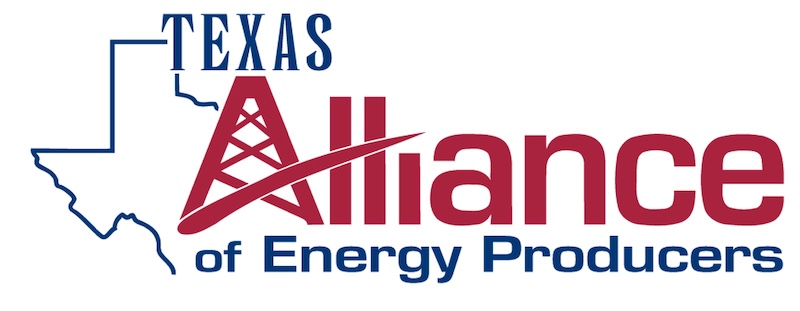RE: House Committees on Ways & Means and Energy Resources—Joint Interim Charge on Oil & Gas Water Recycling and ReuseSept. 14, 2020 The Texas Alliance of Energy Producers submitted information to the House committees on Ways & Means and Energy Resources regarding the committee’s interim charge four: Evaluate the status of water recycling and reuse efforts in the oil and gas industry in Texas and elsewhere. Evaluate options for tax credits, deductions, or discounts to encourage recycling, treatment, or reuse of produced water from oil and gas production activities. Make recommendations on statutory or regulatory changes needed to promote recycling and reuse strategies for produced water. Click here to download pdf of letter. The Honorable Dustin Burrows & the Honorable Chris Paddie Chairman Burrows, Chairman Paddie, and Committee Members— The Texas Alliance of Energy Producers (the Alliance) appreciates the opportunity to comment on the committee’s interim charge related to water recycling and reuse efforts in the oil and gas industry in Texas. With over 2,600 members, the Alliance is the largest state oil and gas association in the US. Our members hail from nearly 30 states and 300 cities. We represent the upstream (exploration and production) segment of the oil and gas industry; our members are oil and gas operators/producers, service and drilling companies, royalty owners, and a host of affiliated companies and industries in Texas and beyond. Given our membership’s role in the oil and gas industry, the Alliance has a unique perspective on water recycling and reuse efforts in the oil and gas industry. In addition to our membership’s operational understanding of recycling and reusing water, the Alliance also has a keen appreciation for this discussion due to the publication of a white paper we produced in conjunction with the Independent Petroleum Association of America last fall titled Sustainable Produced Water Policy, Regulatory Framework, and Management in the Texas Oil and Gas Industry: 2019 and Beyond, which can be found HERE. This white paper explores the challenges of produced water management and improvements in technology, the current statutory and regulatory framework impacting this sector, and makes recommendations on how to improve upon existing laws and practices. As we have seen the shale revolution take hold in Texas over the past two decades, the demand for water for hydraulic fracturing and the increased production of water from oil and gas reservoirs has led to an unprecedented growth in water management and water midstream businesses. Historically, used hydraulic fracturing fluids and produced water were simply injected into disposal wells and industry by-and-large relied on fresh water for the hydraulic fracturing process. Texas took an early lead in recognizing the potential value of recycling and began updating its regulatory framework in 2013. Through industry innovation, supported by statutory and regulatory reforms, Texas has seen more and more oil and gas producers shift to recycling of their fluids and produced water for reuse in hydraulic fracturing operations as opposed to disposing of all of the fluids. Despite these advances, the cost of these technologies used in recycling and reuse in the oilfield have limited wider and faster adoption of these technologies for end uses outside of the oilfield. The opportunity produced water can have for meeting the state’s growing demands for water is worth pursuing as one of the state’s few sources of new water. As our white paper points out, statewide volume of produced water was more than 8.5 billion barrels of water in 2017 and some projections show that by 2023, over 15 billion barrels per year of produced water will be produced statewide in Texas. As Texans, we want to do everything we can to encourage that water to be added to our useable water inventory. The Alliance fully understands that the COVID-19 pandemic and other economic stresses on our budget will limit policy discussions and options available to the state at this juncture. However, we believe the upcoming legislative session provides an opportunity to outline the roadmap for utilizing produced water in Texas. The legislature took an important step last legislative session by directing the Texas Commission on Environmental Quality to seek delegation of authority from EPA over oil and gas discharge through the National Pollution Discharge Elimination System (NPDES) program. This recommendation, which is on track to be completed prior to January 2021, is an important mile marker in improving how state and federal agency cooperation can foster continued improvements that lower additional regulatory burdens. Last session, the House Ways & Means Committee advanced House Bill 2545 proposing a credit against either franchise, gas production, or oil production taxes for “producing freshwater of usable quality from a desalination facility.” Steps such as this one and various others mentioned in our white paper, to incentivize investments in technology for end-users inside and outside of the oilfield, are worth further investigation and study next session. In closing, we encourage the committee members and all stakeholders in the discussion regarding recycling and reusing produced water in Texas to read our white paper to understand more fully our recommendations on how we can achieve a more sustainable future for produced water management. The Alliance applauds your two committees for taking these issues so seriously and we look forward to working with all of you in the upcoming legislative session toward a resolution that will help Texas more fully realize the potential benefits of produced water and ensure our vibrant Texas economy continues to lead. Sincerely, Jason Modglin President
|
Alliance Partners












